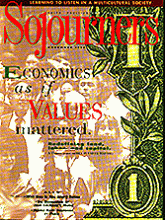Engaging the Powers, the best and most important book I have read in a long time, is third in Walter Wink's trilogy on the "principalities and powers." Wink begins this work with a critique of violence: "Violence is the ethos of our times. It is the spirituality of the modern world." He argues persuasively that violence "and not Christianity, is the real religion of America."
According to Wink "the myth of redemptive violence undergirds American popular culture, civil religion, nationalism, and foreign policy." Children's cartoons bombard us with this myth: Bluto, evil incarnate, seems triumphant before being defeated by Popeye's superior force. There is no premium "put on reasoning, persuasion, negotiation, or diplomacy....Repentance and confession are as alien to them as the love of enemies and nonviolence."
The myth of redemptive violence does more than pollute our children's minds. It finds expression in policies of "nuclear deterrence" and in theories of just war and just revolutions, and is the one notion on which the political Left and Right can agree. It pervades our spirits and our institutions. In fact, it distorts the spirituality of our institutions.
Biblical writers see institutions with both an outer form and an inner spirituality, according to Wink. This might explain why President Clinton, seemingly a decent and non-militaristic man, ordered terrorist-like bombing attacks that killed innocent Iraqi civilians, ostensibly in an effort to punish Saddam Hussein.
Read the Full Article

